Antichess - The Reverse Chess Game
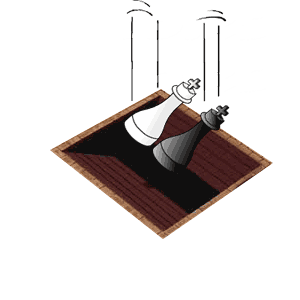
Anti Chess
Now instead of trying to protect your own pieces you want to lose them. And instead of trying to capture your opponent's pieces you need to avoid having to do so. You want to leave his pieces on the board.
Oh and another twist, there is no check or checkmate. The King is just a regular piece and can be taken like any other. You win by losing all your pieces first. If you know this game well and would like to talk about it, feel free to upload an article.
History
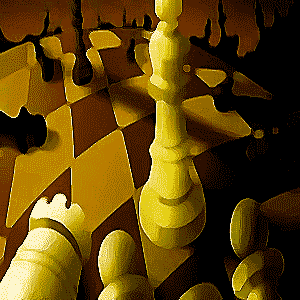
Antichess history stretches back to at least the 1870s
Several players were authoring literature attached to the game in England, Germany and Italy. The standard of play rose slowly but surely as patterns and themes were recognized. This gave rise to opening theory, middlegame strategy and improved endgame play.
Today all of the advanced technology familiar to us from regular chess are also making their mark in Antichess. Engines have calculated many opening systems complete with a jungle of variations. Middlegame strategy is greatly advanced. Endgame tablebases have also come into being.
Rules

Antichess turns the conventional game upside down
- Capturing is compulsory.
- When there is more than one possible capture available you have a choice.
- The King is just another piece and can be exposed to attack and be captured like any other piece.
- Check and checkmate do not exist.
- Castling does not exist.
- Pawns can be promoted to any back row piece including the King.
- In a stalemate situation the player who cannot move wins the game.
- First player to lose all their pieces, or to find themselves without a legal move, wins.
Strategy
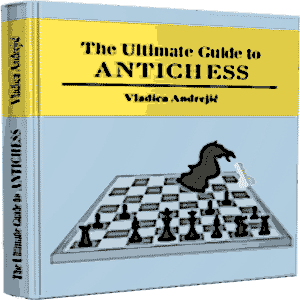
Antichess has it's own strategic dynamic
This variant demands that you get up and running quickly in the pursuit of losing material. The game can be over as a contest in the opening if one player or the other hasn't lost enough pieces. It might be impossible to catch up against an experienced opponent.
It seems you have a forced win as White after 1.e3! but a forced loss after 1.d3?? These results are only forced against a computer or maybe a very, very knowledgeable human adversary.
Against most people you won't be so harshly punished after 1.d3?? and you'll be hard pressed to find the winning line after 1.e3! Still it shows how important it is to play precisely from the very first move.
Play
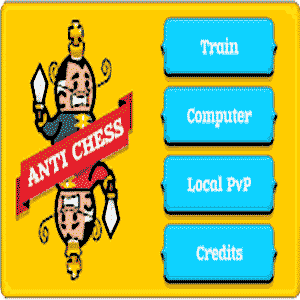
Play it now
You have to bring a new bag of tricks to play this game. Now it's a case of hanging your pieces hopefully without attacking your opponent's forces. Bishops can perish on a3, a6, h3 and h6. Don't advance your forces too much and invite the enemy to invade.
There are more places these days where you can play Antichess on the net. One option is Arcadespot.com.
Have You Played Antichess?
Have you ever played Antichess? The chess game where in order to win you must lose - all your pieces. All of the moves are the same as ordinary chess but strategy is turned on it's head. A completely opposite mindset is required. What does this mean for strategy in terms of opening theory, the middlegame, the endgame? Is strategic theory as developed as the same for regular chess? Are the strategic principles of Antichess as close to a mathematical science as those of chess? What is it like to play this game? Relay your experience of Antichess.
Antichess Stories Left by other Contributors
Click below to see Antichess stories by other Contributors...
Strategy and Experience 




As an experienced chess player, I hated Anti-Chess at first. It felt like those beginning days of chess when the school's 4th grade savant cleared the …
Reverse Psychology: Anti-chess 




The reverse psychology stands behind as a central theme of many creative inventions and optimistic solutions to many critical problems. On the other hand, …
Antichess - Zero Chess Not rated yet
Antichess is a kind of chess in which the main aim of the players is to get all of their pieces captured. Some call this Loser's Chess and others call …
AntiChess - Chess In Reverse Not rated yet
All we knew about chess all this while was the rule of capturing the opponent's pieces. If you had maximum pieces on board along with your king, you would …
Moving On
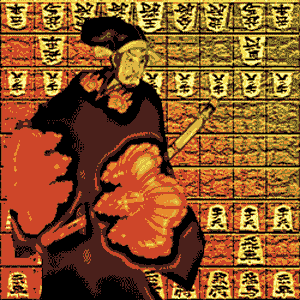
Shogi
Having tried a variant inspired by regular chess, I want to bring you back to the Far East for the next one. Like Xiangqi, it's a game played with flat disks rather than standing figures. But again this only serves to disguise it's closeness to our game.
It reflects many characteristics of Japanese military history and culture. This variant is called Shogi.






